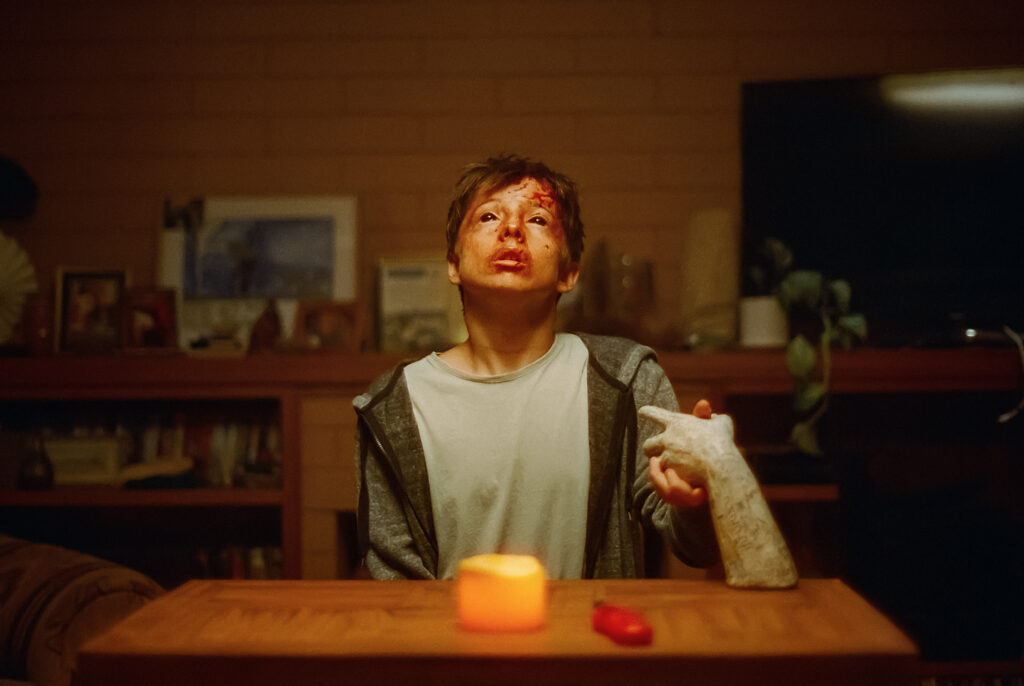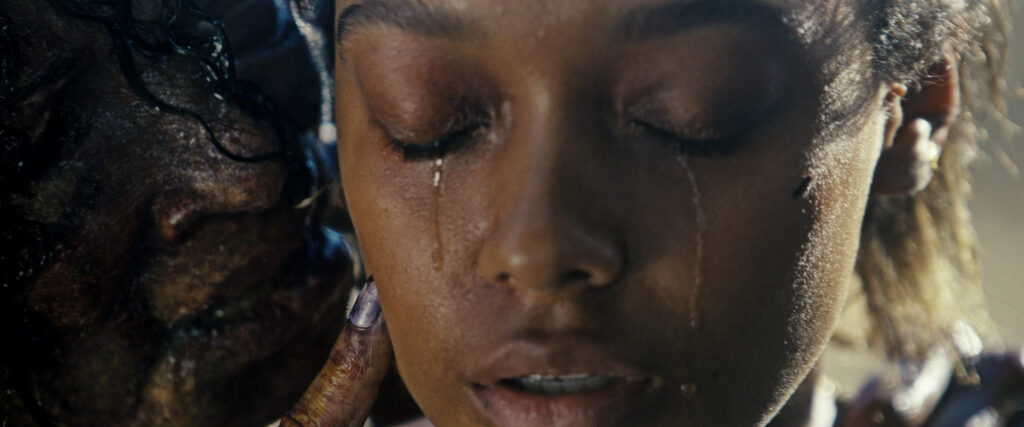July 28, 2023
by Carla Hay

Directed by Danny Philippou and Michael Philippou
Culture Representation: Taking place in an unnamed city in Australia, the horror film “Talk to Me” features a predominantly white cast of characters (with some black people) representing the working-class and middle-class.
Culture Clash: A teenage girl, who is grieving over the unexpected death of her mother, joins some of the students from her high school in a party ritual where they can alter their consciousness by summoning up dangerous spirits that can possess bodies, but then things go very wrong.
Culture Audience: “Talk to Me” will appeal primarily to people who are interested in watching a terrifying and gruesome horror movie with a suspenseful story and good acting.

“Talk to Me” is a genuinely creepy horror movie with some disturbing images that aren’t easily forgotten. The last 15 minutes are rushed and could have been explained better, but most viewers should understand the effective ending. The movie explores themes of regret and grief during supernatural chaos. “Talk to Me” had its world premiere at the 2022 Adelaide Film Festival and its North American premiere at the 2023 Sundance Film Festival.
Directed by brothers Danny Philippou and Michael Philippou, “Talk to Me” is their feature-film directorial debut. “Talk to Me” takes place in an unnamed city in Australia (the nation where the movie was filmed), but the movie’s story could take place in any country or culture where teenagers are always looking for new ways to get thrills from partying. From the movie’s opening scene, “Talk to Me” shows that there’s a menacing danger lurking for the partying teens in the story. Danny Philippou and Bill Hinzman co-wrote the “Talk to Me” screenplay.
The first scene in the movie shows a guy in his late teens named Cole (played by Ari McCarthy) frantically looking for his younger brother Duckett (played by Sunny Johnson) at a crowded house party where the only people there are teenagers. Cole breaks down a bedroom door to find a shirtless Duckett in a daze and sitting on a bed. Duckett’s back is facing Cole. There are noticeable bloody scratches on Duckett’s back.
Duckett is rambling and disoriented as Cole leads him out of the room to go outside and to be taken home. Is Duckett on drugs, is he mentally ill, or both? All of a sudden, Duckett takes out a knife and stabs Cole but doesn’t kill him. And then, Duckett takes out a gun and shoots himself in front of the partygoers. What happened to Cole and Duckett are shown later in the movie.
Meanwhile, at a nearby high school, where most of the students are middle-class, the students have been buzzing about a new way to get high that they don’t want adults to know about at all. Two of the students—a tall, rebellious type named Joss (played by Chris Alosio) and a smirking, androgynous type named Hayley (played by Zoe Terakes)—have come into the possession of an embalmed forearm with mysterious writing all over it. Joss and Hayley are the ringleaders of bringing this forearm to teenage parties to show off as an unexplained “magic trick.”
The word is out that people who go through an occult-like ritual while grasping the arm’s hand will be temporarily possessed by unknown spirits and will experience a high like no other. First, the person holding the hand has to say, “Talk to me,” and then utter, “I let you in.” Students at the school have been video recording these incidents on their phones. These videos have gone viral among the students. The people who look possessed in these videos speak in voices that are not their own, they convulse, their eyes turn black, their faces becomes blotched with strained blood vessels, and they look as if they’ve lost their minds.
The people whose bodies are possessed are also able to see spirits in the room during the possession—and these spirits usually look like rotting corpses. People won’t know in advance if the spirit conjured up will be good or evil. But somehow, Joss and Hayley know that whatever spirit takes possession of people’s bodies cannot stay in that body for more than 90 seconds, or else the spirit will want to permanently stay. As soon as this information is revealed in the movie (the info is also in the “Talk to Me” trailers), it’s easy to figure out what happened to Duckett in the movie’s opening scene. Who will be the next victim of any menacing spirits?
“Talk to Me” focuses on four teenagers who find themselves getting caught up in the mayhem and suffering the consequences. The main protagonist is Mia (played by Sophie Wilde), who’s about 16 or 17 years old. Mia is grieving over the unexpected death of her mother Rhea (played by Alexandria Steffensen), who died one year earlier under mysterious circumstances. Mia’s father Max (played by Marcus Johnson) found Rhea dead in a bathroom at the family home.
The death has been ruled an accident, but Mia has unspoken and probably unfair resentment toward her father for not being there in time to save Rhea. As a result of these hard feelings, Mia barely speaks to he father. Mia also spends as much time away from her house as possible. Mia can usually be found at the house of her best friend Jade (played by Alexandra Jensen), who has known Mia for years.
Jade and Mia do a lot of things that teenage girls do as friends. Mia is much more of a misfit at school than Jade is. Although they are best friends, Mia and Jade have a bit of underlying tension between them because Jade’s boyfriend Daniel (played by Otis Dhanji) is someone whom Mia had a crush on not too long ago. Nothing ever came of this crush except a quick kiss that Mia planted on Daniel, who let her know that he wasn’t interested in dating her.
Daniel and Jade have been dating each other for the past three months. Mia is very surprised when Jade tells her that Daniel and Jade haven’t even kissed yet. However, Mia’s facial experession and body language when she hears this news indicate that she’s secretly pleased that Daniel and Jade haven’t had the intimacy of kissing. The lack of kissing in Daniel and Jade’s relationship later serves as a contrast to one of the most unsettling scenes in the movie. It’s a scene that’s intended to make viewers uncomfortable. Some viewers will be shocked and disgusted.
Rounding out this tight-knight quartet of teens is Jade’s brother Riley (played by Joe Bird), who is 14 years old. Jade sometimes treats Riley like a pest, but Mia (who is an only child) likes hanging out with Riley, whom she treats almost like a younger brother. Riley and Jade live with their divorced mother Sue (played by Miranda Otto), who is always suspicious about Jade and Mia being up to no good. Sue’s suspicion is used as comic relief in “Talk to Me,” which has a lot of dark and horrific moments.
You can almost do a countdown to the scene when Sue will be away from home for a night, and Jade throws a house party with no adult supervision. Needless to say (because it’s already shown in the movie’s trailers), Mia and Riley end up doing the “Talk to Me” ritual on separate occassions. Mia did the ritual under peer pressure but then found herself wanting to know more when she saw visions of her mother’s spirit talking to her. Riley wanted to do the ritual to impress the older teens.
Sensitive viewers should be warned that “Talk to Me” is not for anyone who gets easily squeamish by the sight of blood. There are multiple scenes in the movie where someone repeatedly bashes that person’s own head on hard surfaces, in attempts to commit suicide. The sound effects in these head-bashing scenes are just as nauseauting as all the blood. The same suicidal person also tries to pull that person’s own right eye out of its socket.
“Talk to Me” works so well as a compelling horror movie because the filmmakers wisely chose to center the movie on teenagers—the age group most likely to want to indulge in these dangerous rituals just to be rebellious, even if the consequences could be deadly. The movie adds an extra layer of authenticity in wanting to take these risks when the motive (in Mia’s case) is to see and communicate with a loved one from the spirit world. Wilde’s richly textured performance is what holds “Talk to Me” together when some of the loose threads in the plot threaten to unravel the movie.
The movie comes very close to falling apart toward the end with a flurry of activities that seem like ways to cover up some crucial unanswered questions. The origin of this forearm remains vague (there’s speculation among the teens that it’s the forearm of an unknown serial killer), yet somehow Joss and Hayley seem to know all the “rules” of this forearm. It’s hastily explained that Joss got this forearm from a couple of strangers at a party, and these strangers supposedly told him what to do with the arm.
The subplot over Rhea’s death is also somewhat mishandled. The movie casts doubts over whether her death was really an accident. But based on the injuries that Rhea sustained, a required autopsy would’ve given more clarity. Mia doesn’t have all the details of her mother’s death, but the movie implies that she doesn’t want to know all the details, until she’s prompted to ask her father more questions. “Talk to Me” does a good job of showing that Mia’s grief clouds her judgment. Is that ghost of her mother really her mother, or is it something else disguised as her mother?
Although the “Talk to Me” screenplay isn’t perfect, the movie delivers in serving up plenty of scares and scenarios that will keep viewers riveted, even if what’s on screen might be too sickening for some people’s tastes. Don’t expect “Talk to Me” to be the type of horror movie where all the mysteries are solved by the end. However, “Talk to Me” is definitely the type of horror flick where it’s obvious by the end that this movie was made to have a sequel or a series.
A24 released “Talk to Me” in U.S. cinemas on July 28, 2023.
